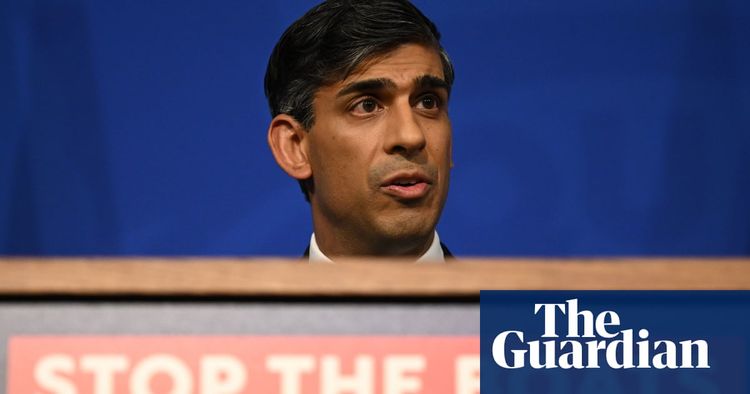Tory MPs lobby to change legislation as splits emerge over Rwanda policy

Conservative Members of Parliament are in conflict with each other, with different groups working to persuade Rishi Sunak to modify his significant legislation concerning Rwanda before its release in the near future.
The leader of the government is scheduled to disclose a fresh legislation in the upcoming week. The officials at Downing Street affirm that the proposed bill will address the apprehensions which were posed by the supreme court in the previous month regarding the program to deport asylum seekers to eastern Africa. This decision came after the home secretary, James Cleverly inked a new accord with Rwanda on Tuesday while visiting Kigali.
On Tuesday evening, insiders reported that Sunak had yet to determine whether the Rwanda bill would take precedence over the Human Rights Act and the European Convention on Human Rights in order to launch the project.
Centrist Conservative Members of Parliament are urging the Prime Minister to uphold the nation's undertakings on human rights. In contrast, right-wing party members refuse to accept a recently introduced legislation that does not specifically supersede these commitments.
The head of the European Research Group, which leans towards the right side politically, declared that their organization will not support any fresh laws that don't "completely honor the governing authority of parliament, with straightforward phrasing."
On Tuesday night, the ERG and two additional groups of backbenchers convened in Westminster. They later stated that they would solely endorse the bill if it obtained the confirmation of a panel of legal specialists led by long-serving MP Bill Cash. This reflects the Brexit vote which caused division within the party.
Some moderate Members of Parliament have given cautionary advice. Damian Green, who leads the One Nation group, shared his thoughts on Tuesday: "The United Kingdom has been a global front-runner in human rights for many years. The government should take a moment to consider the ramifications of disregarding both the European Convention on Human Rights and the Human Rights Act. Urgent and significant decisions of this nature should not be made hastily."
According to sources, it is probable that the government will reject the most extreme courses of action due to concerns that up to 10 ministers may step down if the United Kingdom is perceived as disregarding global regulations.
In the midst of a tense setting among conservative legislators, Cleverly had a meeting with One Nation MPs before departing to Kigali on Monday. Conservative factions on the extreme right claim they have not received communication from either the Home Office or Downing Street, causing concern that they may have failed to persuade the prime minister.
According to a Conservative source with right-wing views, the government appears to be absent and not making any attempts to communicate with their party. They have not received any invitations from No 10, and there are no members of their party serving in the cabinet. This has led to concern among some Conservative members, who are imagining the worst possible scenario.
According to Sunak, the upcoming laws will effectively address the concerns raised by the supreme court. This will ensure that flights can resume by spring next year.
The legislation is intended to collaborate with the latest agreement, where citizens of Great Britain will be required to pay more money to finance the creation of a fresh immigration appeals system in Rwanda.
The fresh deal stipulates that the United Kingdom will be responsible for financing the presence of British and Commonwealth justices who will oversee a newly created appeals system, in addition to bearing the expense of any legal fees incurred by individuals dispatched to Rwanda.
During his recent visit to Kigali, Cleverly joined the ranks of two other UK home secretaries who have signed agreements with the Rwandan government within the past 19 months.
Up until now, government officials have given the Rwandan government a sum of £140 million, but they haven't shared information about the amount of money used in legal disputes to decide if the plan should proceed.
When asked about the possibility of more funds being allocated for the new treaty, Cleverly responded by explaining that international agreements naturally involve financial arrangements. These arrangements are designed to reflect the expenses that could be incurred by Rwanda from the changes that have been made to their legal and institutional systems through this partnership.
Rwandans did not request any funds for this agreement, and no funds were given to them for it. Handling migration is crucial, and although it comes with expenses, we believe it is the moral choice.
He stated that the collaboration between the UK and Rwanda on this matter is significant and not just an easy way to gain quick and inexpensive popularity.
The latest agreement indicates that judges from Great Britain and Commonwealth nations will oversee an entirely new system of appeals in Rwanda's high court, exclusively for extraordinary cases.
Individuals who are sent to Rwanda will receive complimentary legal aid paid for by the public during their case. The government of Rwanda has made it clear that nobody will be expelled to any nation other than the United Kingdom. This allows for a scenario where refugees who engage in criminal activity in Rwanda may be sent back to the UK for deportation.
Professionals hired by the United Kingdom will be temporarily transferred to Rwanda to aid in the evaluation of requests for asylum.
According to the Home Office, the agreement improves the abilities of a supervision group in Rwanda.
Vincent Biruta, who is in charge of Rwanda's relations with foreign countries, claimed that the nation had received unjust treatment from the legal system, global institutions and mass communication. He hinted that some factors related to the inner workings of the United Kingdom might have influenced this outcome.
Fresh data from the Home Office has revealed that a total of 28,318 individuals who have applied for asylum may be at risk of being deported to Rwanda in the future.









































